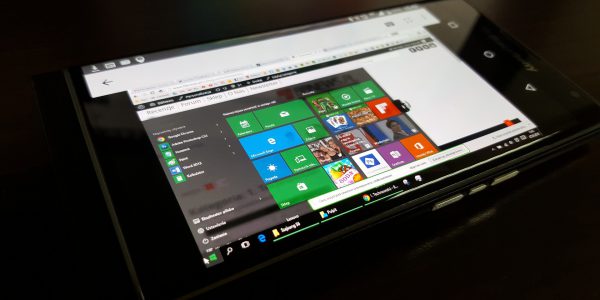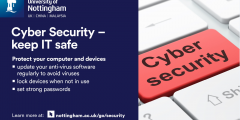New Remote Desktop Gateway
August 6, 2019
Earlier this year, Information Services announced introducing Multi-Factor Authentication (MFA) on the remote access services, specifically: Virtual Private Network (VPN) Remote Desktop Gateway (RDG) Citrix Virtual Desktop The new VPN service went live successfully earlier this year and we are now ready to introduce the new Remote Desktop service, gateway.nottingham.ac.uk. Action required We will soon …
Sophos upgrade 2019
May 13, 2019
From Monday 20 May, Information Services will be upgrading Sophos on all University managed laptop and desktop computers (see schedule below). Sophos will be upgraded to Sophos Central, which utilises cloud based technology to improve detection rates and has a modernised interface. The core functionality of Sophos Anti-Virus will remain the same. The installation of …
Multi-Factor Authentication (MFA) – coming soon
February 4, 2019
As part of the overarching Security Remediation project, led by the University’s Chief Information Security Officer (CISO), we will soon be introducing Multi-Factor Authentication (MFA). MFA is used to mitigate against password guessing and theft, including brute force attacks. MFA can also be called 2-step verification or 2-factor authentication (2FA). It requires users to approve access requests via the …
Awareness of phishing emails
November 27, 2018
As a large institution, the University of Nottingham will, from time to time, be targeted for malicious emails including spam, viruses, malware and phishing attacks. These emails can cause a lot of damage to University data but also could have significant personal impact, including financial consequences. Our users have reported recent Phishing emails with the …
Cyber awareness – Wireless security
October 19, 2017
The university has been made aware of a significant cyber ‘flaw’ that can impact wireless security. The ‘flaw’, which has been termed as ‘Key Reinstallation Attack’ (KRACK), can leave devices connected via Wi-Fi more vulnerable to hijack and attack. Information Services are taking actions to protect the university, but in the meantime, we would please …
New Cyber Security video
October 10, 2017
Staying safe online – new material for students In order to increase awareness regarding cyber safety, Information Services have produced a number of new promotional materials for students to promote ‘staying safe online’. Firstly, we’ve produced a new video, featured on our IT Services YouTube playlist – which captures the key messages for students about …
Cyber attacks target universities
September 7, 2017
As we move closer towards the start of a new academic session, Information Services would ask our UoN community to be particularly vigilant regarding cyber security and phishing attacks, as we will very likely see an increase in activity at this time of year, especially targeting new students. This week the BBC reported reported that …
Cyber attacks target Universities
June 19, 2017
Following last month’s cyber-attack that threatened NHS computer systems, last week the BBC reported that a University had been hit by a similar cyber-attack. These ‘ransomware’ attacks can be initiated via ‘phishing’ emails which link to destructive software or by visiting ‘compromised’ websites where pop-ups may also spread a malware infection. Computer systems are then …
University Phishing attacks
April 12, 2017
Information Services is aware that UK Universities are currently receiving multiple phishing email attacks and as such users are advised to be vigilant against such attempts to gain details. These emails normally ask you to follow a web link and/or ask for bank account details or personal credentials. Such emails are coming in from spoofed …
Spoofed email addresses
Reports of ‘Spoofed’ email addresses Information Services has recently received reports of ‘spoofed’ email addresses being used to gain confidential information from members of staff. Read more about recent phishing attacks to University email. What are Spoofed email addresses? A spoofed email address appears to be registered to an individual who works for the University, usually …








